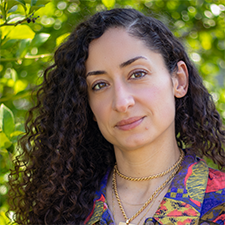 Sarah Elkeaikati is the Program Coordinator of the UCLA Institute for Technology, Law & Policy at the UCLA School of Law and UCLA Samueli School of Engineering, where she supports high-impact initiatives at the inter
Sarah Elkeaikati is the Program Coordinator of the UCLA Institute for Technology, Law & Policy at the UCLA School of Law and UCLA Samueli School of Engineering, where she supports high-impact initiatives at the inter

Save the date! This year's Digital Media & Video Games Conference will be held on November 7, 2025.
Past Conferences
-
2024 Conference
GC Roundtable - (1.25h General CLE)
The best GCs are those who are conversant on cutting edge legal and business issues. The panelists on the GC Roundtable will discuss the cutting edge legal and business issues that they or their respective GCs believe must be considered by digital media and video game companies.
Moderator:
Rusty Weiss, Partner, Sidley Austin LLPPanelists:
Matthew Breitman, Senior Vice President - General Counsel Americas and Corporate Secretary, Take-Two Interactive Software, Inc.
Eric Grouse, Vice President & Deputy General Counsel, Sony Interactive Entertainment
Adam Sullivan, General Counsel, Square Enix
Ethics of Responsible Gaming - (1h Ethics CLE)
Ethics of Responsible Gaming - The video game industry is uniquely positioned at the intersection of rapidly evolving technology and regulations that are trying to keep up, resulting in gray areas through which lawyers have to guide their clients. This panel interrogates the role of attorneys, their professional obligations, and their ethical duties as they navigate this ambiguity.
Moderator:
Maria Abesa, Senior Counsel, Business & Legal Affairs, Square EnixPanelists:
Andrew Bardi, Associate General Counsel, Reality Labs, Meta
Stacy Feuer, Senior Vice President, ESRB Privacy Certified
Felix Hilgert, Partner, Osborne Clarke
Zachary Lewis, Associate, Frankfurt Kurnit Klein + Selz
Lunch Presentation – Digital Media and Video Games: The Competition Hollywood Has for Consumer Attention - (0.5h General CLE)
The entertainment industry may have enough to worry about in 2024 as its core film and TV businesses feel the pressure of adapting to a streaming-driven marketplace. But the truth is the challenges Hollywood face now holding onto its audiences extends far beyond the production of premium long-form video. Intended as a companion of sorts to the "After the Streaming Wars" presentation given in June at UCLA's 48th Annual Entertainment Symposium this presentation takes a look at the competitive landscape for consumer attention, including video games, the creator economy, social video, immersive entertainment, and of course, AI. Enough talk about binge watching and themed popcorn buckets; let's talk about Roblox, Apple Vision Pro, the Sphere in Las Vegas and other innovations.
Presenter:
Andrew Wallenstein, Chief Media Analyst and President, Variety Intelligence Platform (VIP+)
Annual Litigation Update: Part 1 - (1h General CLE)
The first part of our annual litigation update will examine some of the top cases and disputes from the prior year or so affecting the digital media and video game space – including, among others, those involving rights of publicity, rights of privacy, first amendment, trademarks and copyright.
Moderator:
Doug Lichtman, Professor, UCLA School of LawPanelists:
William Sloan Coats, Sole Practitioner, Law Office of William Sloan Coats
Marc Mayer, Partner, Mitchell Silberberg & Knupp LLP
Annual Litigation Update: Part 2 - (0.5h General CLE)
The second part of our annual litigation update will summarize the cases involving Epic Games v. Apple and v. Google, including a recently filed new complaint, and include discussion of what is presently allowed in the app stores in terms of in-app purchases and side payments.
Presenter:
Jennifer Dixton, Assistant Chief, Special Counsel for Policy & Intellectual Property, Antitrust Division, U.S. Department of Justice, Lecturer in Law, UCLA School of Law
Show Me the Money! The Impact of NIL and Private Equity on Sports, Video Games & Digital Media - (1h General CLE)
Reference to “NIL” is in the news on a near daily basis. This panel will discuss why NIL seems to be everywhere, NIL’s emergence and intersection with rights of publicity, and how the associated money is impacting digital media, video games & sports, including the sports-media landscape. This includes a look at how such ties in with the recent surge in popularity of women’s sports, the return of EA Sports’s NCAA Football video game, and the potential for more money – an increase in private equity investment in sports and what that means.
Moderator:
Seth J. Steinberg, Principal, Digital Arts LawPanelists:
Andrew Eiger, Vice President of Legal and Business Affairs, Overtime
Sara Gotfredson, Founder, Trailblazing Sports Group (formerly VP, ESPN/Disney)
Gary Rosenfeld, Head of Business Development, Big Fish Games
Mark Tratos, Shareholder, Greenberg Traurig
Cross-Media IP Exploitation in Entertainment and Gaming - (1h General CLE)
This panel will discuss how entertainment and video game companies are expanding and licensing their IP to create cross-media entertainment products that span games, film, TV, books, podcasts, live events, merchandising and digital media to reach new fans and engage audiences. Successful franchise expansion is dependent on the rights and licensing of IP, which our panelists will address from a legal and business perspective across different types of entertainment and media. Our discussion will also include key trends and legal challenges in cross-media linear adaptations using video game IP as source material, as well as the use of TV/film storytelling IP in games and other media.
Moderator:
Cooper Jackson, Senior Vice President, Business Affairs & Development, Electronic ArtsPanelists:
Pam Reynolds, Director & Associate General Counsel of Legal Affairs, Amazon MGM Studios
Ned Sherman, Chief Business Affairs & Legal Officer, Skybound Entertainment
Jenifer Wallis, Chair of Entertainment Practice, Munck Wilson, Mandala, LLP
Rusty Weiss, Partner, Sidley Austin LLP
CA MCLE Credits: UCLA School of Law is a State Bar of California approved MCLE provider. By attending all sessions, you may earn up to 6.25 credits (5.25 hours of general credit and 1 hour of legal ethics credit). CLE Readings
2024 Conference Reception Sponsor


Mario Biagioli, a distinguished professor of law and communication at UCLA and leading scholar of law and technology, died on May 17 after a long illness.